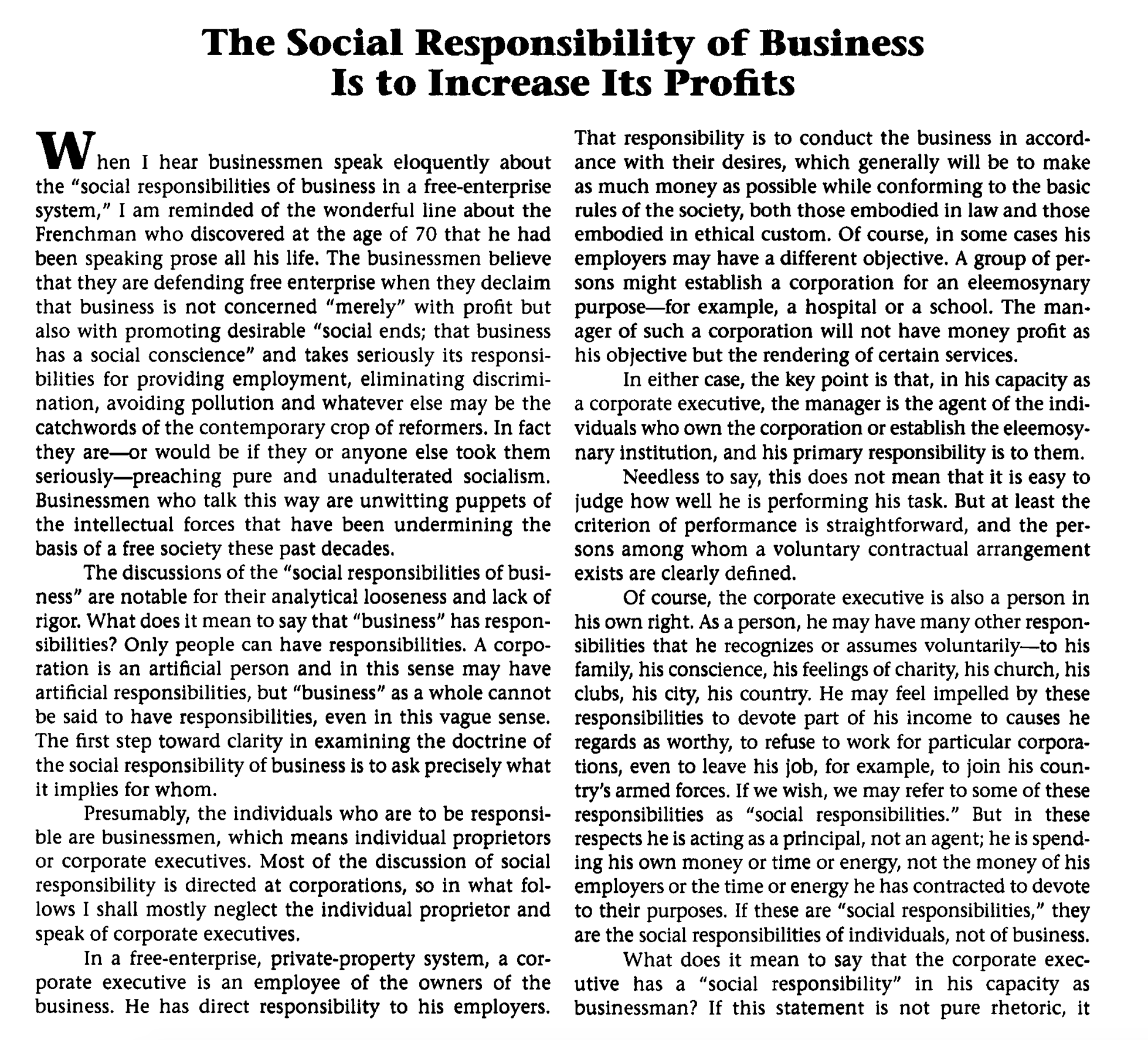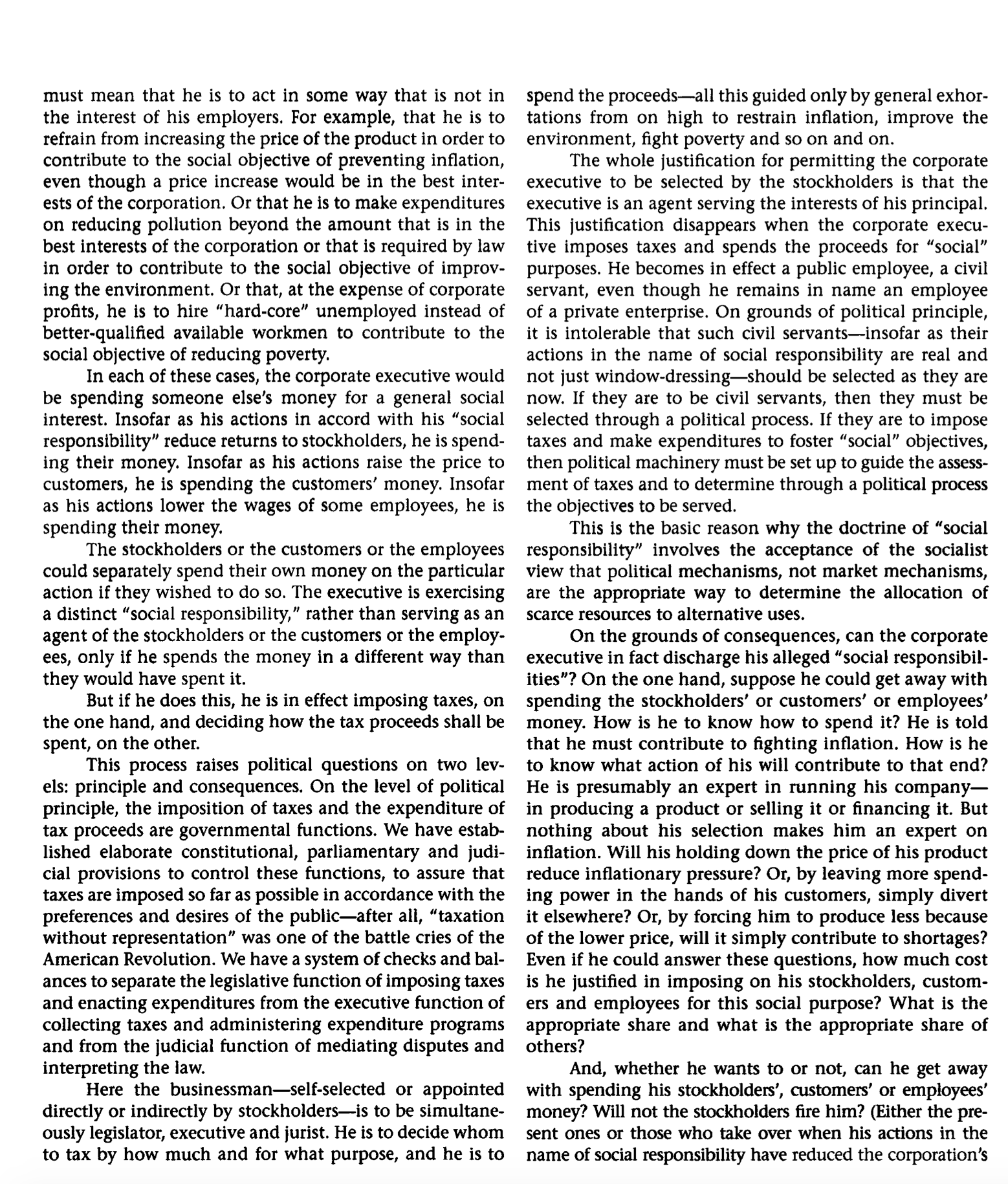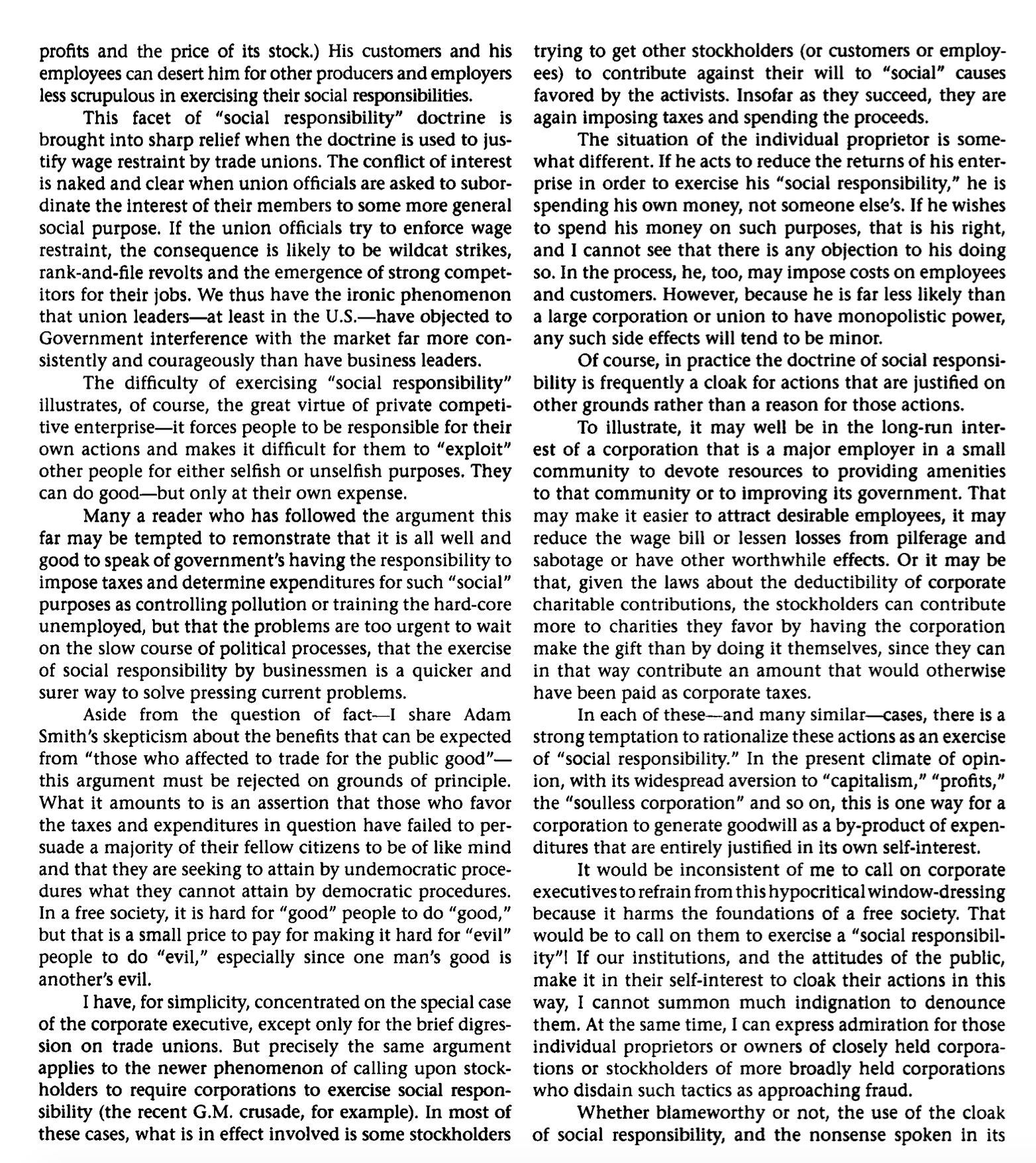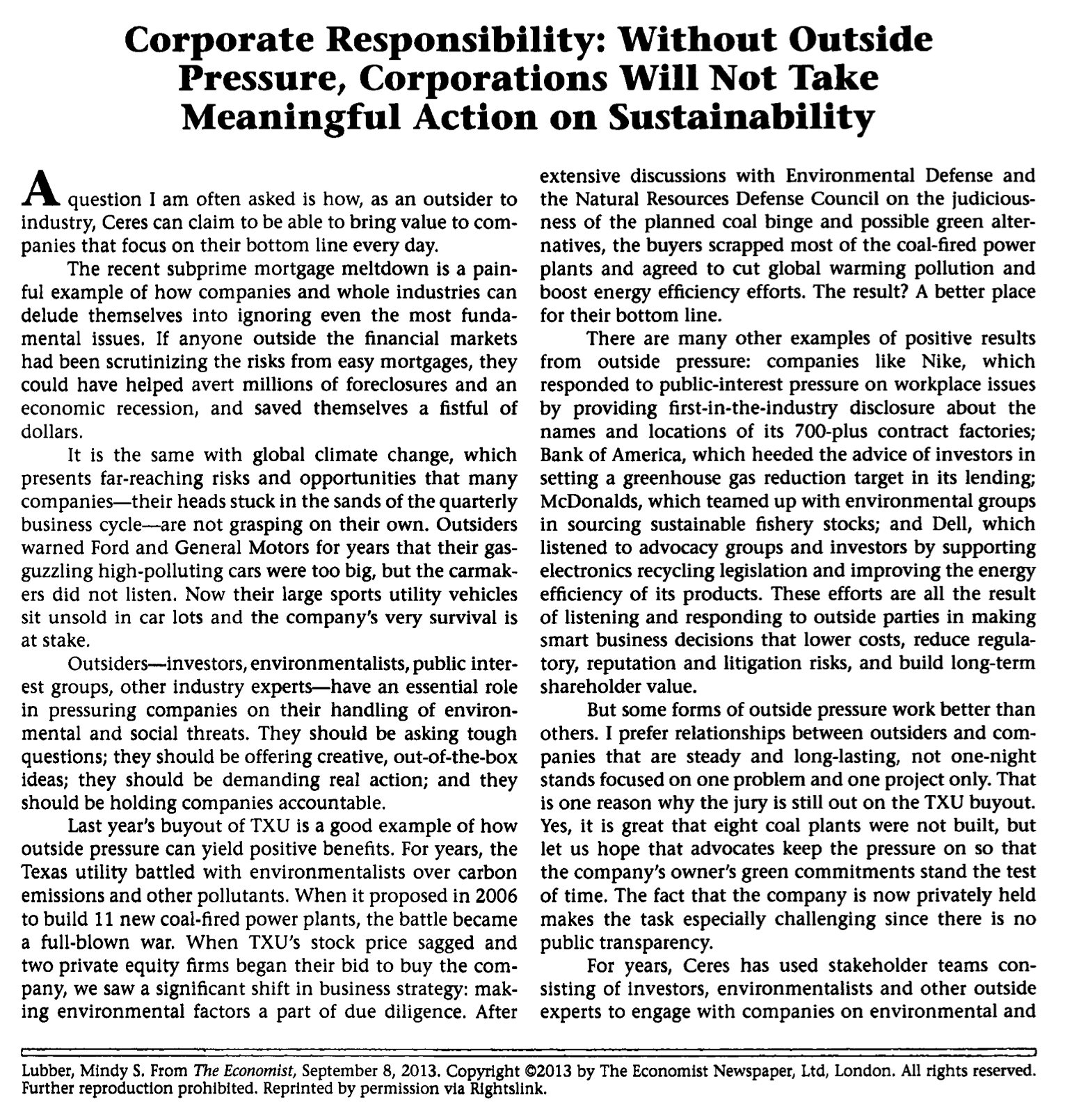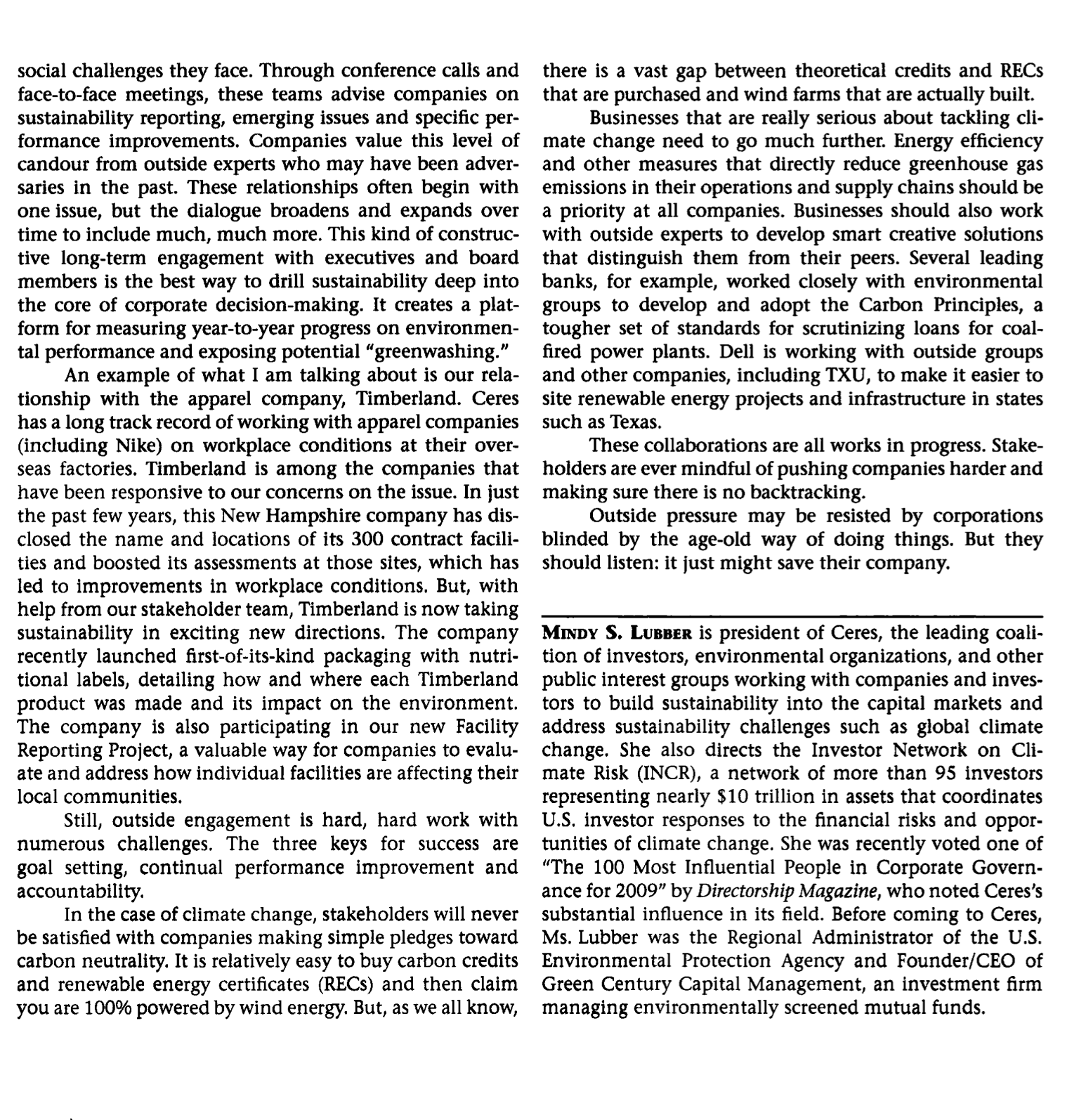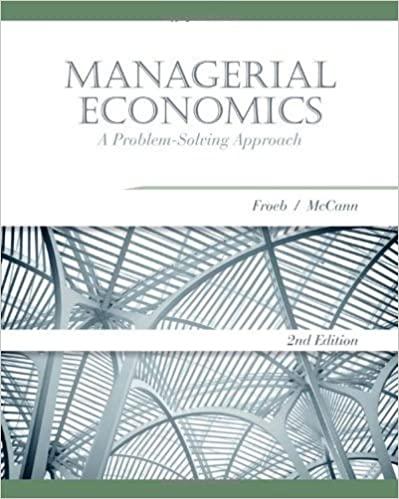Answer questions based on the readings.
1) What is the social responsibility of business? Also briefly explain what he meant by "hypocritical window dressing."
2) Summarize Lubber's argument.
The Social Responsibility of Business Is to Increase Its Prots When I hear businessmen speak eloquently about the \"social responsibilities of business in a free-enterprise system,\" I am reminded of the wonderful line about the Frenchman who discovered at the age of 70 that he had been speaking prose all his life. The businessmen believe that they are defending free enterprise when they declaim that business is not concerned \"merely" with prot but also with promoting desirable "social ends; that business has a social conscience\" and takes seriously its responsi- bilities for providing employment, eliminating discrimi- nation, avoiding pollution and whatever else may be the catchwords of the contemporary crop of reformers. In fact they areor would be if they or anyone else took them seriouslypreaching pure and unadulterated socialism. Businessmen who talk this way are unwitting puppets of the intellectual forces that have been undermining the basis of a free society these past decades. The discussions of the \"social responsibilities of busi- ness" are notable for their analytical looseness and lack of rigor. What does it mean to say that "business" has respon- sibilities? Only people can have responsibilities. A corpo- ration is an articial person and in this sense may have articial responsibilities, but "business" as a whole cannot be said to have responsibilities, even in this vague sense. The rst step toward clarity in examining the doctrine of the social responsibility of business is to ask precisely what it implies for whom. Presumably, the individuals who are to be responsi- ble are businessmen, which means individual proprietors or corporate executives. Most of the discussion of social responsibility is directed at corporations, so in what fol- lows I shall mostly neglect the individual proprietor and speak of corporate executives. In a free-enterprise, private-property system, a cor- porate executive is an employee of the owners of the business. He has direct responsibility to his employers. That responsibility is to conduct the business in accord- ance with their desires, which generally will be to make as much money as possible while conforming to the basic mles of the society, both those embodied in law and those embodied in ethical custom. Of course, in some cases his employers may have a different obiective. A group of per- sons might establish a corporation for an eleemosynary purposefor example, a hospital or a school. The man- ager of such a corporation will not have money prot as his objective but the rendering of certain services. In either case, the key point is that, in his capacity as a corporate executive, the manager is the agent of the indi- viduals who own the corporation or establish the eleemosy- nary institution, and his primary responsibility is to them. Needless to say, this does not mean that it is easy to judge how well he is performing his task. But at least the criterion of performance is straightforward, and the per- sons among whom a voluntary contractual arrangement exists are clearly dened. Of course, the corporate executive is also a person in his own right. As a person, he may have many other respon- sibilities that he recognizes or assumes voluntarilyto his family, his conscience, his feelings of charity, his church, his clubs, his city, his country. He may feel impelled by these responsibilities to devote part of his income to causes he regards as worthy, to refuse to work for particular corpora- tions, even to leave his iob, for example, to join his coun- try's armed forces. If we wish, we may refer to some of these responsibilities as "social responsibilities." But in these respects he is acting as a principal, not an agent; he is spend- ing his own money or time or energy, not the money of his employers or the time or energy he has contracted to devote to their purposes. If these are \"social responsibilities,\" they are the social responsibilities of individuals, not of business. What does it mean to say that the corporate exec- utive has a \"social responsibility\" in his capacity as businessman? If this statement is not pure rhetoric, it must mean that he is to act in some way that is not in the interest of his employers. For example, that he is to refrain from increasing the price of the product in order to contribute to the social objective of preventing ination, even though a price increase would be in the best inter- ests of the corporation. Or that he is to make expenditures on reducing pollution beyond the amount that is in the best interests of the corporation or that is required by law in order to contribute to the social objective of improv- ing the environment. Or that, at the expense of corporate prots, he is to hire \"hard-core\" unemployed instead of better-qualied available workmen to contribute to the social objective of reducing poverty. In each of these cases, the corporate executive would be spending someone else's money for a general social interest. Insofar as his actions in accord with his \"social responsibility" reduce returns to stockholders, he is spend- ing their money. Insofar as his actions raise the price to customers, he is spending the customers' money. Insofar as his actions lower the wages of some employees, he is spending their money. The stockholders or the customers or the employees could separately spend their own money on the particular action if they wished to do so. The executive is exercising a distinct "social responsibility," rather than serving as an agent of the stockholders or the customers or the employ- ees, only if he spends the money in a different way than they would have spent it. But if he does this, he is in effect imposing taxes, on the one hand, and deciding how the tax proceeds shall be spent, on the other. This process raises political questions on two lev- els: principle and consequences. On the level of political principle, the imposition of taxes and the expenditure of tax proceeds are governmental functions. We have estab- lished elaborate constitutional, parliamentary and judi- cial provisions to control these functions, to assure that taxes are imposed so far as possible in accordance with the preferences and desires of the publicafter all, "taxation without representation\" was one of the battle cries of the American Revolution. We have a system of checks and bal- ances to separate the legislative function of imposing taxes and enacting expenditures from the executive function of collecting taxes and administering expenditure programs and from the judicial function of mediating disputes and interpreting the law. Here the businessmanself-selected or appointed directly or indirectly by stockholdersis to be simultane- ously legislator, executive and jurist. He is to decide whom to tax by how much and for what purpose, and he is to spend the proceedsall this guided only by general exhor- tations from on high to restrain ination, improve the environment, ght poverty and so on and on. The whole justication for permitting the corporate executive to be selected by the stockholders is that the executive is an agent serving the interests of his principal. This justication disappears when the corporate execu- tive imposes taxes and spends the proceeds for \"social\" purposes. He becomes in effect a public employee, a civil servant, even though he remains in name an employee of a private enterprise. 0n grounds of political principle, it is intolerable that such civil servantsinsofar as their actions in the name of social responsibility are real and not just window-dressingshould be selected as they are now. If they are to be civil servants, then they must be selected through a political process. If they are to impose taxes and make expenditures to foster "social\" objectives, then political machinery must be set up to guide the assess ment of taxes and to determine through a political process the objectives to be served. This is the basic reason why the doctrine of \"social responsibility" involves the acceptance of the socialist view that political mechanisms, not market mechanisms, are the appropriate way to determine the allocation of scarce resources to alternative uses. On the grounds of consequences, can the corporate executive in fact discharge his alleged \"social responsibil- ities"? 0n the one hand, suppose he could get away with spending the stockholders' or customers' or employees' money. How is he to know how to spend it? He is told that he must contribute to ghting ination. How is he to know what action of his will contribute to that end? He is presumably an expert in running his company in producing a product or selling it or nancing it. But nothing about his selection makes him an expert on ination. Will his holding down the price of his product reduce inationary pressure? Or, by leaving more spend- ing power in the hands of his customers, simply divert it elsewhere? Or, by forcing him to produce less because of the lower price, will it simply contribute to shortages? Even if he could answer these questions, how much cost is he justied in imposing on his stockholders, custom- ers and employees for this social purpose? What is the appropriate share and what is the appropriate share of others? And, whether he wants to or not, can he get away with spending his stockholders', customers' or employees' money? Will not the stockholders re him? (Either the pre- sent ones or those who take over when his actions in the name of social responsibility have reduced the corporation's prots and the price of its stock.) His customers and his employees can desert him for other producers and employers less scrupuIOus in exercising their social responsibilities. This facet of "social responsibility" doctrine is brought into sharp relief when the doctrine is used to jus- tify wage restraint by trade unions. The conict of interest is naked and clear when union ofcials are asked to subor- dinate the interest of their members to some more general social purpose. If the union ofcials try to enforce wage restraint, the consequence is likely to be wildcat strikes, rank-andle revolts and the emergence of strong compet- itors for their jobs. We thus have the ironic phenomenon that union leadersat least in the U.S.have objected to Government interference with the market far more con- sistently and courageously than have business leaders. The difculty of exercising "social responsibility" illustrates, of course, the great virtue of private competi- tive enterpriseit forces people to be responsible for their own actions and makes it difcult for them to "exploit" other people for either selsh or unselsh purposes. They can do goodbut only at their own expense. Many a reader who has followed the argument this far may be tempted to remonstrate that it is all well and good to speak of government's having the responsibility to impose taxes and determine expenditures for such \"social" purposes as controlling pollution or training the hard-core unemployed, but that the problems are too urgent to wait on the slow course of political processes, that the exercise of social responsibility by businessmen is a quicker and surer way to solve pressing current problems. Aside from the question of factl share Adam Smith's skepticism about the benets that can be expected from \"those who affected to trade for the public good" this argument must be rejected on grounds of principle. What it amounts to is an assertion that those who favor the taxes and expenditures in question have failed to per- suade a majority of their fellow citizens to be of like mind and that they are seeking to attain by undemocratic proce- dures what they cannot attain by democratic procedures. In a free society, it is hard for \"good\" people to do \"good," but that is a small price to pay for making it hard for \"evil\" people to do "evil," especially since one man's good is another's evil. I have, for simplicity, concentrated on the special case of the corporate executive, except only for the brief digres- sion on trade unions. But precisely the same argument applies to the newer phenomenon of calling upon stock- holders to require corporations to exercise social respon- sibility (the recent GM. crusade, for example). In most of these cases, what is in effect involved is some stockholders trying to get other stockholders (or customers or employ- ees) to contribute against their will to \"social\" causes favored by the activists. insofar as they succeed, they are again imposing taxes and spending the proceeds. The situation of the individual proprietor is some- what different. If he acts to reduce the returns of his enter- prise in order to exercise his \"social responsibility," he is spending his own money, not someone else's. If he wishes to spend his money on such purposes, that is his right, and i cannot see that there is any objection to his doing so. In the process, he, too, may impose costs on employees and customers. However, because he is far less likely than a large corporation or union to have monopolistic power, any such side effects will tend to be minor. Of course, in practice the doctrine of social responsi- bility is frequently a cloak for actions that are justied on other grounds rather than a reason for those actions. To illustrate, it may well be in the long-run inter- est of a corporation that is a major employer in a small community to devote resources to providing amenities to that community or to improving its government. That may make it easier to attract desirable employees, it may reduce the wage bill or lessen losses from pilferage and sabotage or have other worthwhile effects. Or it may be that, given the laws about the deductibility of corporate charitable contributions, the stockholders can contribute more to charities they favor by having the corporation make the gift than by doing it themselves, since they can in that way contribute an amount that would otherwise have been paid as corporate taxes. In each of these-and many similarcases, there is a strong temptation to rationalize these actions as an exercise of \"social responsibility.\" in the present climate of opin~ ion, with its widespread aversion to \"capitalism,\" "prots,\" the \"soulless corporation" and so on, this is one way for a corporation to generate goodwill as a by-product of expen ditures that are entirely justied in its own self-interest. It would be inconsistent of me to call on corporate executives to refrain from this hypocritical window-dressing because it harms the foundations of a free society. That would be to call on them to exercise a \"social responsibil- ity\"i If our institutions, and the attitudes of the public, make it in their self-interest to cloak their actions in this way, I cannot summon much indignation to denounce them. At the same time, I can express admiration for those individual proprietors or owners of closely held corpora- tions or stockholders of more broadly held corporations who disdain such tactics as approaching fraud. Whether blameworthy or not, the use of the cloak of social responsibility, and the nonsense spoken in its Corporate Responsibility: Without Outside Pressure, Corporations Will Not Take Meaningful Action on Sustainability A question I am often asked is how, as an outsider to industry, Ceres can claim to be able to bring value to com- panies that focus on their bottom line every day. The recent subprime mortgage meltdown is a pain- ful example of how companies and whole industries can delude themselves into ignoring even the most funda- mental issues. If anyone outside the nancial markets had been scrutinizing the risks from easy mortgages, they could have helped avert millions of foreclosures and an economic recession, and saved themselves a stful of dollars. It is the same with global climate change. which presents far-reaching risks and opportunities that many companiestheir heads stuck in the sands of the quarterly business cycleare not grasping on their own. Outsiders warned Ford and General Motors for years that their gas- guzzling high-polluting cars were too big, but the carmak- ers did not listen. Now their large sports utility vehicles sit unsold in car lots and the company's very survival is at stake. Outsidersinvestors, environmentalists, public inter- est groups, other industry expertshave an essential role in pressuring companies on their handling of environ- mental and social threats. They should be asking tough questions; they should be offering creative, out-ofthe-box ideas; they should be demanding real action; and they should be holding companies accountable. Last year's buyout of TXU is a good example of how outside pressure can yield positive benets. For years, the Texas utility battied with environmentalists over carbon emissions and other pollutants. When it proposed in 2006 to build 11 new coal-red power plants, the battle became a full-blown war. When TXU's stock price sagged and two private equity rms began their bid to buy the com- pany, we saw a signicant shift in business strategy: mak- ing environmental factors a part of due diligence. After extensive discussions with Environmental Defense and the Natural Resources Defense Council on the judicious- ness of the planned coal hinge and possible green alter- natives, the buyers scrapped most of the coal-red power plants and agreed to cut global warming pollution and boost energy efciency efforts. The result? A better place for their bottom line. There are many other examples of positive results from outside pressure: companies like Nike, which responded to public-interest pressure on workplace issues by providing rst-in-the-industry disclosure about the names and locations of its 700-plus contract factories; Bank of America, which heeded the advice of investors in setting a greenhouse gas reduction target in its lending; McDonalds, which teamed up with environmental groups in sourcing sustainable shery stocks; and Dell, which listened to advocacy groups and investors by supporting electronics recycling legislation and improving the energy efciency of its products. These efforts are all the result of listening and responding to outside parties in making smart business decisions that lower costs, reduce regula- tory, reputation and litigation risks, and build long-term shareholder value. But some forms of outside pressure work better than others. I prefer relationships between outsiders and com- panies that are steady and long-lasting, not one-night stands focused on one problem and one project only. That is one reason why the jury is still out on the TXU buyout. Yes, it is great that eight coal plants were not built, but let us hope that advocates keep the pressure on so that the company's owner's green commitments stand the test of time. The fact that the company is now privately held makes the task especially challenging since there is no public transparency. For years, Ceres has used stakeholder teams con- sisting of investors, environmentalists and other outside experts to engage with companies on environmental and w Lubber, Mindy S. From The Economist, September 8, 2013. Copyright 2013 by The Economist Newspaper, Ltd, London. All rights reserved. Further reproduction prohibited. Reprinted by permission via Rightslink. social challenges they face. Through conference calls and face-to-face meetings, these teams advise companies on sustainability reporting, emerging issues and specic per- formance improvements. Companies value this level of candour from outside experts who may have been adver- saries in the past. These relationships often begin with one issue, but the dialogue broadens and expands over time to include much, much more. This kind of construc- tive long-term engagement with executives and board members is the best way to drill sustainability deep into the core of corporate decision-making. It creates a plat- form for measuring year-toyear progress on environmen- tal performance and exposing potential \"greenwashing.\" An example of what I am talking about is our rela- tionship with the apparel company, Timberland. Ceres has a long track record of working with apparel companies (including Nike) on workplace conditions at their over- seas factories. Timberland is among the companies that have been responsive to our concerns on the issue. In just the past few years, this New Hampshire company has dis- closed the name and locations of its 300 contract facili- ties and boosted its assessments at those sites, which has led to improvements in workplace conditions. But, with help from our stakeholder team, Timberland is now taking sustainability in exciting new directions. The company recently launched rst-ofits-kind packaging with nutri- tional labels, detailing how and where each Timberland product was made and its impact on the environment. The company is also participating in our new Facility Reporting Project, a valuable way for companies to evalu- ate and address how individual facilities are affecting their local communities. Still, outside engagement is hard, hard work with numerous challenges. The three keys for success are goal setting, continual performance improvement and accountability. In the case of climate change, stakeholders will never be satised with companies making simple pledges toward carbon neutrality. It is relatively easy to buy carbon credits and renewable energy certicates (RECs) and then claim you are 100% powered by wind energy. But, as we all know, there is a vast gap between theoretical credits and RECs that are purchased and wind farms that are actually built. Businesses that are really serious about tackling cli- mate change need to go much further. Energy efciency and other measures that directly reduce greenhouse gas emissions in their operations and supply chains should be a priority at all companies. Businesses should also work with outside experts to develop smart creative solutions that distinguish them from their peers. Several leading banks, for example, worked closely with environmental groups to develop and adopt the Carbon Principles, a tougher set of standards for scrutinizing loans for coal- fired power plants. Dell is working with outside groups and other companies, including TXU, to make it easier to site renewable energy projects and infrastructure in states such as Texas. These collaborations are all works in progress. Stake- holders are ever mindful of pushing companies harder and making sure there is no backtracking. Outside pressure may be resisted by corporations blinded by the age-old way of doing things. But they should listen: it just might save their company. MINDY S. Lem: is president of Ceres, the leading coali- tion of investors, environmental organizations. and other public interest groups working with companies and inves- tors to build sustainability into the capital markets and address sustainability challenges such as global climate change. She also directs the Investor Network on Cli- mate Risk (INCR), a network of more than 95 investors representing nearly $10 trillion in assets that coordinates us. investor responses to the nancial risks and oppor- tunities of climate change. She was recently voted one of "The 100 Most Inuential People in Corporate Govern- ance for 2009" by Directorship Magazine, who noted Ceres's substantial inuence in its field. Before coming to Ceres, Ms. Lubber was the Regional Administrator of the us. Environmental Protection Agency and Founder/CEO of Green Century Capital Management, an investment rm managing environmentally screened mutual funds
